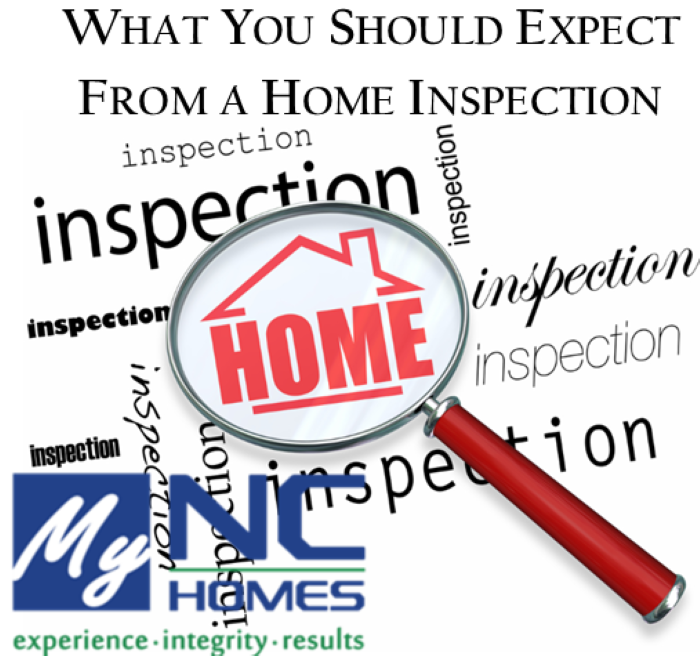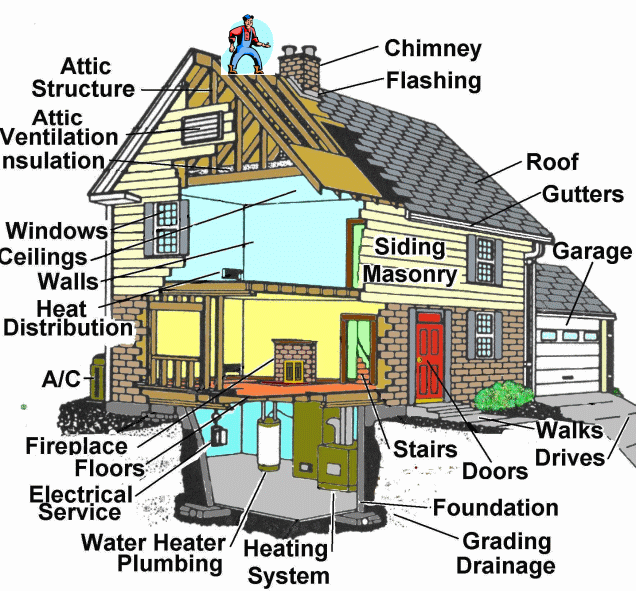What You Should Expect From a Home Inspection
Posted by Larry Tollen on Tuesday, August 25th, 2020 at 10:34am
Getting Ready for Your Home Inspection 
You're under contract and you or your agent has set up the home inspection. It's time to get ready for a roller coaster ride of emotions.
There's the excitement that comes from really getting to take a good hard look at the home you're buying. It's typically the longest time you are in the house before you own it.
There's anxiety. What if the inspector finds something wrong? So wrong you can't buy the house?
Impatience. Where's my report? How bad is it? What's it going to cost to repair these things and how soon do I need to get them all done? Why hasn't the Seller responded to my request yet. Ugh, I hate this, when will it be over?
With countless hundreds of home inspections under our belts; you can rest a little easier knowing that we've been there many times before. Our advice is simple: Relax, take a deep breath we're here for you. We can and will help you through it. There's a number of reasons you don't want to skip this step particularly here in North Carolina which is a "Caveat Emptor" (let the Buyer Beware) State. Unfortunately and despite repeated requests by the North Carolina Association of Realtors to modify it, the mandated Seller Disclosure that Buyers must receive is relatively meaningless. Seller's are offered the option to answer questions about the condition of their home by marking the form "No Representation" essentially taking the 5th or they may answer either "Yes" or "No". It's important to understand that "No" may mean either there is no problem or that the seller doesn't know if there's a problem. Remember every state is different, your experiences in one state may not apply in another. This is one more reason it is to a Buyer's advantage to work with an experienced Realtor who can advise you when purchasing real estate.
It's also extremely important for buyers to understand that in North Carolina our contracts are "As-Is", in other words the seller is under no obligation to address any of the items uncovered during your inspections. This isn't to say they won't negotiate with you, but depending on market conditions what a Buyer can reasonably expect will vary. Currently we're in a "Sellers Market"and Sellers and their agents know this. If you're buying an older home there should be no expectation that a Seller will make it new for you, if you want a new home you'll have to buy new construction. An experienced agent understands that out of the dozens of listed "Deficiencies" on the typical home inspection report, only a couple are likely to be really significant, a second group of 5-10 issues will be things that will need to be addressed sooner rather than later, and the rest are minor issues that can be addressed along the way. In our current market getting the seller to address the few truly significant issues is all that a Buyer should expect. When the market returns to a "Neutral or Buyers Market"&which it inevitably will, then Seller's will have to be prepared to address this second group of issues and possibly more.
A Home Inspector as Protector
An inspector helps you make sure a house isn't hiding anything before you commit for the long haul.
A home inspector identifies any reasonably discoverable problems with the house such as a leaky roof, faulty plumbing, wiring, siding etc. Hiring an inspector is doing your due diligence. It's important to understand not all inspectors are created equal. At My NC Homes we have a pretty short list of inspectors we recommend and pretty stringent requirements in order for an inspector to be considered for our list. For more on this be sure to check out our Blog: Home Inspections - The Good, The Bad and The Ugly one of our most popular Blogs over the past five years.
Most Inspection Reports come in the form of an outline and cover the following items:
- Roofing
- Exterior
- Structure
- Electrical
- Heating
- Cooling
- Insulation
- Plumbing
- Interior
Your report will contain pictures and or illustrations to help you, your agent and the Sellers understand the deficiencies identified within the report.
Depending on the age of the Heating and cooling systems we often recommend hiring a heating and cooling contractor to do a more detailed inspection than the home inspector can perform as these are expensive pieces of equipment to replace. We often recommend Radon Inspections which some inspectors include but many do not. Depending on what the inspector notes we may also recommend additional inspections be performed for a chimney and fireplace, or by a structural engineer if the home inspector notes issues in the foundation etc. In North Carolina it's important for home buyers to have a Wood Destroying Insect Inspection (frequently referred to as a termite inspection) and this is done by licensed exterminators not a general home inspector. If your home is serviced by a well and/or septic system these will need to be inspected by a licensed installer.
The Inspector Won't Check Everything
Generally, inspectors only examine houses for problems that can be seen with the naked eye. They aren't permitted to open up walls and we are unaware of any magical X-ray visiondevices, to find hidden faults.
Inspectors also won't put themselves in danger. If a roof is too high or steep, for example, they won't climb up to check for missing or damaged shingles. They'll use binoculars to examine it instead.
They can't predict the future, either. While an inspector can give you a rough idea of how many more years that roof will hold up, he or she can't tell you exactlywhenit will need to be replaced.
Finally, home inspectors are generalists. A basic inspection doesn't routinely include a thorough evaluation of:
- Swimming pools
- Wells
- Structural engineering work
- The ground beneath a home
- Fireplaces and chimneys
- Generators
- Irrigation systems
When it comes to wood-burning fireplaces, for instance, most inspectors will open and close dampers to make sure they're working, check chimneys for obstructions like birds nests, and note if they believe there's reason to pursue a more thorough safety inspection.
Show Up for Inspection (with Your Agent)
While your presence is not required; we highly recommend you attend. Even though you'll receive a report summarizing the findings later on, being there gives you a chance to have your questions answered and to learn the inner workings of the home.
Block out two to four hours for the inspection depending on the size of the home your buying. Your Agent can tell you how long to expect to be there. We tell our clients if it's not possible for them to attend the entire inspection to come for the final hour so that they can get a summary form the inspector and have the opportunity to ask questions. The inspector will survey the property from top to bottom. This includes checking water pressure; leaks in the attic, plumbing, etc.; if door and window frames are straight (if not, it could be a sign of a structural issue); if electrical wiring is up to code; if smoke and carbon monoxide detectors are working; if appliances work properly. Outside, he or she will look at things like siding, fencing, and drainage. It important to remember that the inspector is there to identify the problems not to quote repair costs. Many inspectors now use automated estimators for repairs but these should be taken with a grain of salt. Experienced agents can help you with cost projections and or trusted service providers/contractors.
Get Ready to Negotiate
Once you receive the inspector’s report it's time to review it with your agent.
Legally in North Carolina sellers are not currently required to make any repairs.
Most home repairs, however, are negotiable. Be prepared to pick your battles: Minor issues, like a cracked switchplate or loose kitchen faucet, are easy and cheap to fix on your own. You don't want to start nickel-and-diming the seller.
If there are major issues with the house, your agent can submit a formal request for repairs that includes a copy of the inspection report. We do not advise our buyers to request repairs, rather we suggest that if possible they request money in lieu of repairs. (This can be handled depending a number of different ways, you'll need to discuss this with your Agent. The reason is simple, Seller's have no motivation other than to make the least expensive repair possible. It's much better to handle this yourself and get it done by the person of your choosing, the way you want and to get any warranty that the contractor may offer. If you must request repairs,Repair requests should be as specific as possible. For instance: Instead of saying repair broken windows, a request should say replace broken window glass in master bathroom.
- If the seller agrees to make all of your repair requests:He or she must provide you with evidence that the repairs were completed. If you are concerned consider having your inspector go back to verify the repairs. Most inspection reports contain boiler plate language that routinely says "Repairs to be done by a licensed contractor". Not everything requires a licensed contractor, it depends on the work being done. If a licensed contractor is used; an invoice from stating that the repairs were made should be provided. Then it's full steam ahead towards closing the sale.
- If the seller responds to your repair requests with a counteroffer: He or she will state which repairs (or credits at closing) he or she is willing to make. The ball is in your court to either agree, counter the seller's counteroffer, or void the transaction and forfeit the diligence fee paid to the Seller when the contract was made.
At the end of the day, remember to check in with yourself to see how you're feeling about all of this. You need to be realistic about how much repair work you'll be taking on. If you don't feel comfortable you need to speak up.
The most important things to remember during the home inspection? Trust your inspector, trust your gut, and lean on your agent; they likely have a lot of experience to support your decision-making.

Leave A Comment